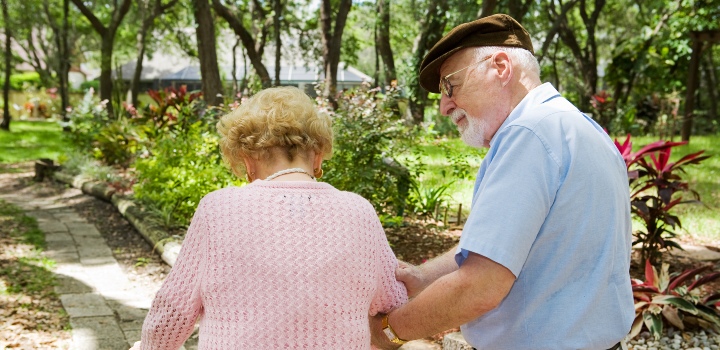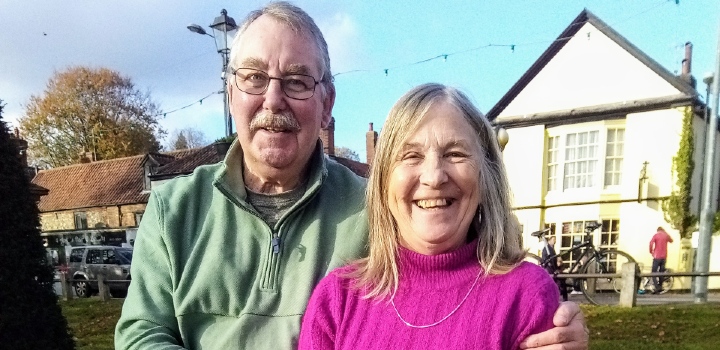2 million project to support UK dementia carers
By: Communications

Researchers at the University of East Anglia and Norfolk and Suffolk NHS Foundation Trust (NSFT) are launching a new project to improve the lives of dementia carers in the UK.
They will work with carers and healthcare workers to co-develop and test a new ‘Carecoach’ support package – thanks to almost £2 million in funding from the National Institute for Health Research (NIHR).
The aim of the blended care initiative is to help dementia carers stay emotionally and physically well – which is crucial for both the carer and the person they support and care for.
The project is particularly important in relation to the coronavirus pandemic, which has left many people with dementia and their carers more isolated than ever.
The project is being led at UEA by Dr Jane Cross from the School of Health Sciences and Prof Chris Fox from Norwich Medical School.
Dr Cross said: “Around 700,000 family carers support 850,000 people in the UK with dementia.
“Dementia is a deteriorating condition where the person loses one ability after another. Caring for someone with dementia puts enormous strain on the family carer’s energies, resilience, physical and mental well-being and family relationships.
“The coronavirus pandemic has put an additional stress on carers, many of whom are older, vulnerable or shielding. It means they can become even more isolated and cut off from their wider support network of family, friends, health services and support groups.
Prof Fox said: “We know that family carers provide significant support for people with dementia with very limited support for them. But it’s really important that carers get the right support too.
“We want to help carers improve their quality and life, mood and sense of being able to care well.â€
Previous research has shown that intervening early to support carers builds personal resilience and enhances their ability to cope.
The research team will build on work carried out in the Netherlands, where a ‘Partner in Balance’ intervention has already been shown to reduce the burden and stress of caring for a family member or friend with dementia.
Prof Fox said: “We will develop a UK version of the Partner in Balance programme combining face-to-face sessions, a web-based home programme and support from a coach.
“The Carecoach support package will include additional film clips and other materials to better reflect the UK population and care situations.
“We will work with family carers and healthcare professionals to develop and test our new blended care approach – to really make sure it works in real life,†he added.
Juniper West, Research Development Lead, Older People’s Services at NSFT, said: “In 2018-19, our research team ran a project to identify top research priorities, involving 126 service users, family or friend carers and clinical staff from our dementia and older people’s mental health services.
“The top priority was around training and support for informal caregivers for people with dementia, so the Carecoach research programme addresses very important, locally expressed needs.
“I have been fortunate to work with Geoff Fenwick, a family carer originally involved in our research priorities project with his wife Susie, who will now work alongside our team in delivering the Carecoach study.â€
The research initiative will be led by UEA and NSFT, in collaboration with the University of Bradford, London School of Hygiene & Tropical Medicine, the University of Nottingham, the University of Amsterdam, and Maastricht University.
The team will also work with collaborators including Dementia UK, the Alzheimer’s Society, the TIDE network of carers, former carers and health and care professionals (Together In Dementia Everyday) and INTERDEM (the European network on research into early detection and timely intervention in dementia). Software will be developed by Ilionx.
The project is hosted by the Frailty Research Group which is part of UEA Health and Social Care Partners (UEAHSCP).
Geoff and Susie Fenwick’s story

Geoff has been married to Susie for 31 years, in late 2011 they first noticed a decline in Susie’s short-term memory. In spring 2012 they sought medical advice and Susie was eventually diagnosed with early onset Alzheimer’s.
Alzheimer’s affects people in different ways, in Susie’s case she became anxious and withdrew from friends. She had taken early retirement and was at home on her own – not easy when you are having to accept and adjust to dementia. Geoff, who will be a co-researcher on the new Carecoach study, soon ran his business down and retired in 2015 so he could become Susie’s full time carer.
Geoff said: “Acceptance I feel was probably the first and hardest step to take when coming to terms with dementia, once we had achieved that we were able to take a more proactive approach in adapting our relationship and lifestyle to the demands of dementia. Focussing on what we could do, not what we could no longer do.â€
One of Geoff and Susie’s many strategies was to take part in research, both clinical trials and lifestyle assessments. They started Susie’s clinical trial in London in 2013 which is still ongoing and gives them access to possible new treatments yet to become available through the NHS.
They have also found lifestyle research to be equally important as it helps health professionals understand what it is really like for both the person with dementia and their carer.
Geoff said: “We joined this in 2014 and have taken part in several different studies run locally by NSFT and UEA over the last six years - all very interesting and enjoyable for both of us - the kindness and respect we have had from the researchers has been second to none.â€
However, Geoff feels Carecoach is different as its ultimate aim is to help carers establish viable techniques and strategies for coping with the challenges that dementia throws up for both themselves and the people they care for. It is not aimed at health professionals, it is aimed at an army of untrained everyday people who need help.
“As a co-researcher and existing carer my involvement in the project will bring vital first-hand experiences to help model the training programme,†he said.
“Personally, it will be a boost for my own mental health wellbeing and hopefully I will learn a few new tricks along the way, as well as being able to share ideas that have worked for us. If you want to know the road ahead ask those coming back.â€
Related Articles

Children who eat more fruit and veg have better mental health
Children who eat a better diet, packed with fruit and vegetables, have better mental wellbeing according to new research from the University of East Anglia Health and Social Care Partners.
Read more
UEA scientists to uncover infections that could cause aggressive prostate cancer
Researchers from the University of East Anglia are investigating whether certain infections could trigger the development of aggressive prostate cancer thanks to funding from leading mens health charity Prostate Cancer UK.
Read more
Thousands of men to trial prostate cancer home testing kit
Thousands of men worldwide are to receive a home test kit for prostate cancer thanks to pioneering research from the University of East Anglia and the Norfolk and Norwich University Hospital (NNUH).
Read more